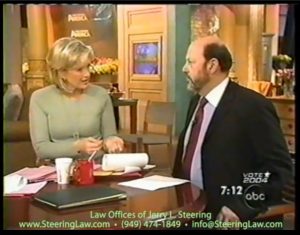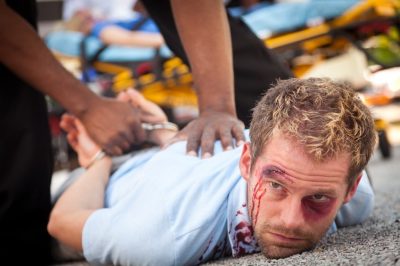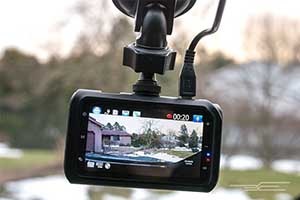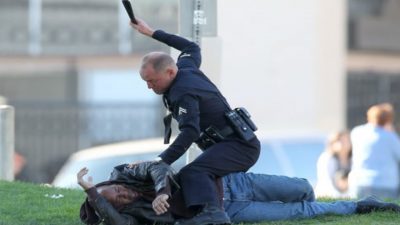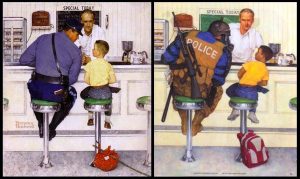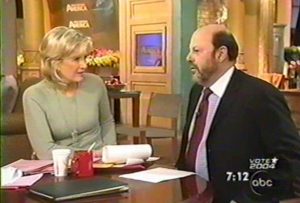Four Steps to Curbing Police Misconduct in the United States
Sometimes Even Nice Innocent People Really Are Subjected to Police Outrages.
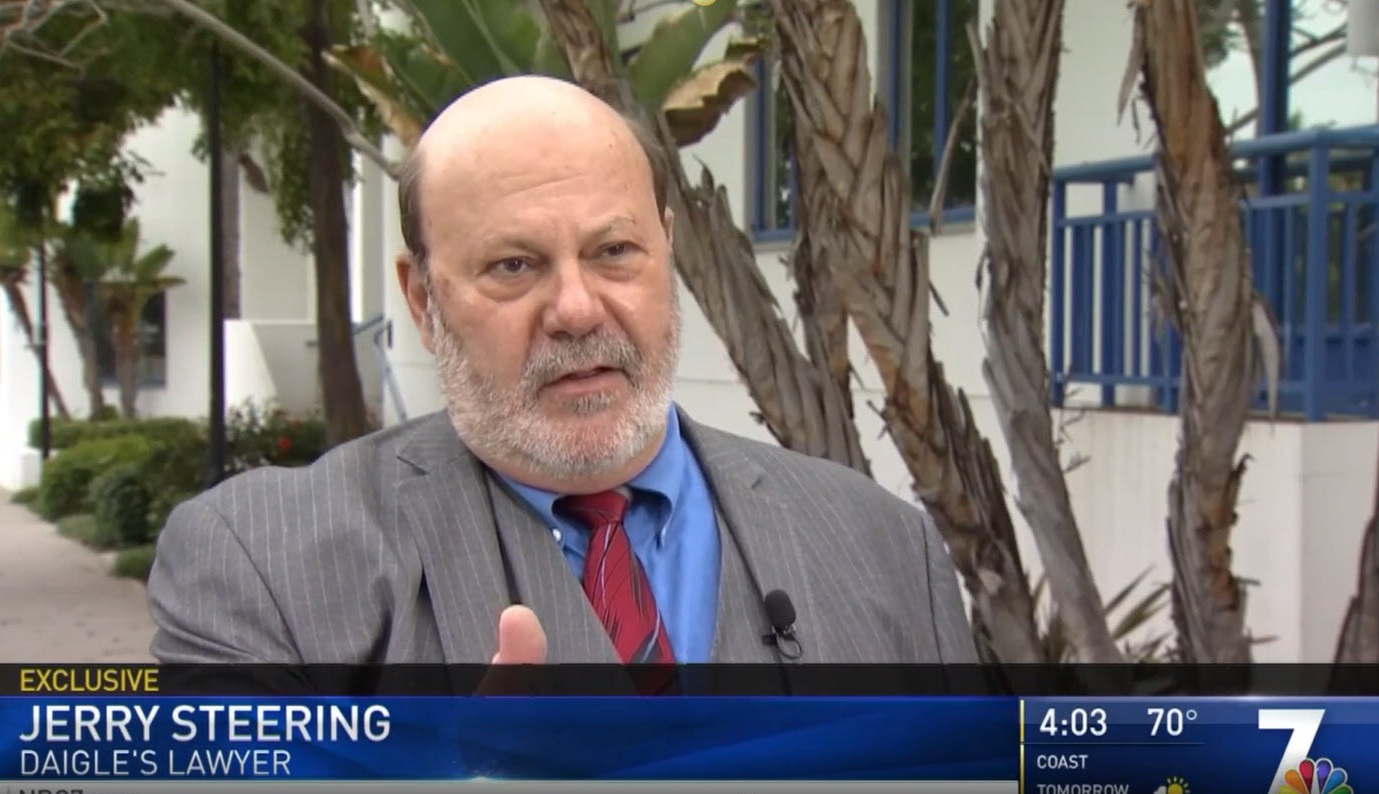 Most Americans also truly believe that since they don’t commit any crimes other than speeding or an occasional DUI, that the police are not going to bother them; and, if they do, that the police will treat them respectfully and professionally. After all, this has been the experience of most law-abiding / good-citizen type Americans with the police, save brown colored folks, who get pulled-over all of the time for non-existent or de minimis traffic violations. types are treated respectfully and professionally, and those who aren’t treated so nicely must deserve it. Sometimes, however, those of law-abiding / good-citizen types are mistreated by the police. It really does happen, and when it does, the entire world-view of those good-citizen types is shattered. They just cannot believe what happened.
Most Americans also truly believe that since they don’t commit any crimes other than speeding or an occasional DUI, that the police are not going to bother them; and, if they do, that the police will treat them respectfully and professionally. After all, this has been the experience of most law-abiding / good-citizen type Americans with the police, save brown colored folks, who get pulled-over all of the time for non-existent or de minimis traffic violations. types are treated respectfully and professionally, and those who aren’t treated so nicely must deserve it. Sometimes, however, those of law-abiding / good-citizen types are mistreated by the police. It really does happen, and when it does, the entire world-view of those good-citizen types is shattered. They just cannot believe what happened.
Maybe you’re a black male good-citizen type and you’re driving a new Mercedes-Benz in the nice neighborhood where you live. That will get you pulled over often. That is not lefty propaganda. That is reality. It’s amazing how many license plate tags get covered-up by mud on Mercedes-Benz autos driven by black people in nice neighborhoods; even in liberal California. See, e.g. Beverly Hills while Black’: Race, wealth, policing collide on Rodeo Drive, Los Angeles Times, November 5, 2021.
Maybe the officer just pats-down all motorists who he stops, notwithstanding any constitutional prohibition of such warrantless and suspicion-less searches. This really does happen. After all, it’s safer but unlawful for an officer to frisk anyone that he stops, and with many cops, if you appear in any way to be of semi-questionable character, they are going to want to frisk you. See, e.g., Factsheet: NYPD Stop and Frisk Policy.
Also, the police know that in the real world, all that they have to say (i.e. police reports, court testimony) is that they want to go home (alive) at the end of their duty-shift, and a judge or jury is not going to fault them for patting-down just about anyone, for just about any reason; something long held to be unconstitutional. See, Terry v, Ohio, 392 U.S. 1 (1968) (“stop and frisk” a 4th Amendment violation, unless the officer is aware of facts that would cause a reasonably well-trained officer to believe that the person whom he/she is dealing with is engaged in “criminality afoot“, and are armed and dangerous).
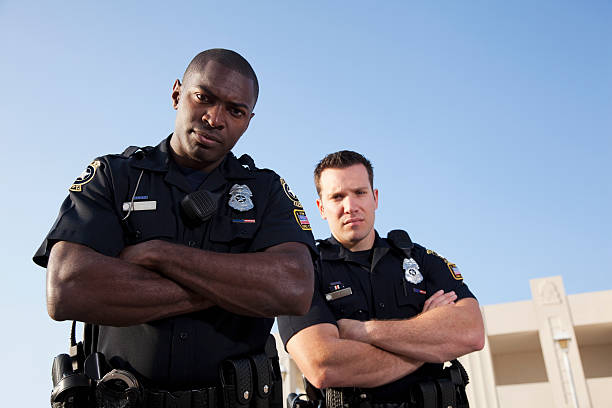 Maybe the officer just doesn’t like your attitude. Maybe the officer was having a bad-day, and when he approached your car he barked at you, and you did not appreciate it, so you ask the officer why he’s treating you that way. Maybe the officer stopped you in an area where a dark colored sedan was just involved in a robbery, and you are driving a dark colored sedan. You don’t know about the dispatch to the officer about the robbery and the car, and you also know that you have not done anything wrong. So, when the officer flashes the red and blue lights, pulls you over, approaches you at gunpoint and orders you to exit your car, you ask the officer “Why Officer. What’s going on?”. The officer now quickly gets perturbed with your questioning him about why he is ordering you to exit your car and prone yourself out on the street, instead of you immediately complying with his orders.
Maybe the officer just doesn’t like your attitude. Maybe the officer was having a bad-day, and when he approached your car he barked at you, and you did not appreciate it, so you ask the officer why he’s treating you that way. Maybe the officer stopped you in an area where a dark colored sedan was just involved in a robbery, and you are driving a dark colored sedan. You don’t know about the dispatch to the officer about the robbery and the car, and you also know that you have not done anything wrong. So, when the officer flashes the red and blue lights, pulls you over, approaches you at gunpoint and orders you to exit your car, you ask the officer “Why Officer. What’s going on?”. The officer now quickly gets perturbed with your questioning him about why he is ordering you to exit your car and prone yourself out on the street, instead of you immediately complying with his orders.
Now the officer doesn’t like your attitude. The officer again demands immediate compliance with his order to exit the car and prone-out on the street, and, instead, you simply again ask “Why Officer?” What is going on?” Thereafter, in any of these situations, the officer is no longer interested in the speeding violation; not that he ever really was (pretextual stops were “blessed” by the Supreme Court in 1996 in Whren v. United States). Now the focus of the officer’s attention is your questioning or challenging his authority. You are now guilty of “contempt of cop“; verbal protest or challenge to the officer’s orders or authority.
The officer now feels that he can get away with beating-you-up, and often then does so to “overcome your resistance”. Now, it’s your criminal act that necessitated the police punching you in the face with police “distraction blows“; something now commonly used by today’s police officers to justify punching a civilian in his face. This is no joke; the police really use this excuse to punch someone’s lights out.
As a result, next thing that you experience is you being pulled out of your car, tossed down onto the pavement, getting knee-dropped by the officer, handcuffed, sometimes punched-out, taken away to jail, and charged with some bogus “resistance offense“, for not jumping fast enough when the officer said to exit your car; for “delaying” the officer’s investigation, by failing to immediately comply with the officer’s order to exit, notwithstanding your constitutional right to not have to immediately comply with police orders. See, People v. Quiroga, 16 Cal. App. 4th 964 (1993) (” . . . a person need not respond with alacrity to police commands”).
The Police Protect Themselves from Their Victims By Falsely Arresting and Falsely Accusing Them of Resistance Offenses.
If the officer injured the good-citizen type badly enough, the police will increase the severity of the “resistance offense”, from say misdemeanor resisting / delaying / obstructing officer (i.e. Cal. Penal Code § 148(a)(1), “The Boot of the Police State“) if the officer doesn’t injure you badly, to felony “resisting officer with threat of or use of violence” (Cal. Penal Code § 69, “The Hammer of Oppression“) if they beat you up somewhat badly.
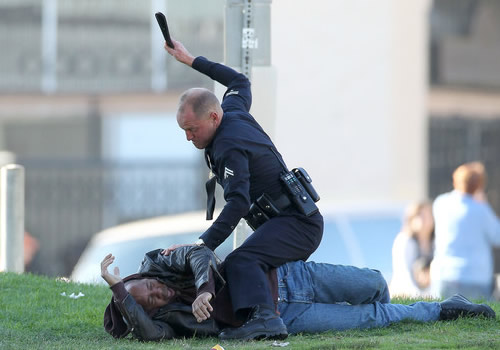 If they beat you up really badly, or even shoot you and you survive, they will charge you with felony assault on a peace officer and/or assault with a deadly weapon on a peace officer. This is how things work in the real world.
If they beat you up really badly, or even shoot you and you survive, they will charge you with felony assault on a peace officer and/or assault with a deadly weapon on a peace officer. This is how things work in the real world.
Although you have a long established constitutional right to verbally protest and challenge police orders and actions (People v. Quiroga, 16 Cal. App. 4th 964 (1993)) and Houston v. Hill, 482 U.S. 451 (1987)), that will usually not stop your criminal prosecution for doing just that.Your local District Attorney’s Office, realizing that the officer may now have a civil liability problem, without looking at or listening to any recordings, and just relying on the materially fabricated police reports, will then prosecute you for some “resistance offense” that you are innocent of. This is no joke. Again, this is reality.
The truth is, that Deputy District Attorney’s who are assigned to reviewing cases have very little time to actually review a case before deciding to file the same. All that they do have time for, is to look at the police reports submitted by the police for prosecution, and decide based only on those reports whether or not to criminally prosecute you.
Because resistance offenses are so inherently vague and ambiguous, almost any situation involving the police and a civilian can be spun to create some set of facts that can be characterized as “resisting” or “obstructing” or “delaying” a peace officer. This is reality. This is how things happen in the real world. See, “Contempt of Cop / Resisting Arrest Cases“.
When that happens to the law-abiding / good-citizen types , they are in disbelief. They no longer view the world through Blue-Colored-Lenses. They feel betrayed by the very institution that they admired and supported.
Why We Believe That The Police Don’t Do Bad Things to People Who Don’t Deserve It.
We are taught since childhood to believe that the police are here to “Serve and Protect” us from criminals, and sometimes, from ourselves (i.e. drug possession). These words are ingrained in our American psyche. When prospective jurors are asked “Why do you think someone becomes a police officer“, ninety-five or so out of one-hundred will say: “To Protect and Serve“.
Moreover, everyone has biases, and none of us can view the world other than through lenses colored by those biases. Because most Americans have never been the subject of police outrages, or have never personally seen such events, most law-abiding Americans see the world through blue-colored-lenses; confirmation bias toward the police.
When we hear about an altercation between a police officer and a civilian, we assume that the officer is “in the right“, and that the civilian is “in the wrong“. It is a natural reaction of most Americans, due to their confirmation bias toward the police.
Even when we see video recordings of police officers using force upon another, due to our “confirmation bias“, we tend to see the event from the police perspective, unless their conduct is so indefensible that even the creepiest cop or politician just cannot justify it.
Most law abiding good-citizen types don’t mind if the police routinely stop and frisk suspicious looking types, or search them without any legal justification for doing so. After all, if they have nothing to hide, why should they object to having their persons and cars searched?
Most law abiding good-citizen types also don’t mind when a police officer searches a drug dealer’s or gang member’s car without a warrant. Only the lawyers and Judges (and the defendant) care about the illegal search. The public doesn’t cry because the constable violated the gangster’s constitutional rights; they cheer for the bad-guy getting his comeuppance.
They don’t mind, because they cannot imagine the police ever stopping and frisking them. If they thought that there was a realistic possibility of an officer demanding that they exit their cars, and subject them and their car to a warrantless and suspicionless search, they would think about the issue differently. They just don’t think that it could happen to them.
Why We Believe That The Courts Protect the Criminals from the Police.
Most Americans, those without a real understanding of the American Criminal Justice System, see our criminal justice system as a bunch of hired-gun lawyers and liberal judges, more concerned with the rights of the accused than those of the victims. Of course the problem with that mentality, is that the person who is on trial and is being prosecuted is the only one whose rights and freedom are in jeopardy. Most of our Bill of Rights is protection against the police and the courts for those suspected of or charged with crimes.
 Moreover, due to popular cop movies like Dirty Harry, the public has a truly mistaken impression about our laws and our legal system. For example, most Americans are under the mistaken impression that the police are somehow legally obligated to “read you your rights“, your “Miranda Warnings” if they arrest you; something completely untrue.
Moreover, due to popular cop movies like Dirty Harry, the public has a truly mistaken impression about our laws and our legal system. For example, most Americans are under the mistaken impression that the police are somehow legally obligated to “read you your rights“, your “Miranda Warnings” if they arrest you; something completely untrue.
All that Miranda v. Arizona, 384 US 436 (1966) held is that if you are under arrest, if the police question you without first advising you of your right to counsel and right against self-incrimination, then the prosecution cannot introduce your answers to their questions at your criminal trial. However, if you testify at your criminal trial, the prosecution can then introduce your custodial statement, because the Exclusionary Rule is not a license to lie.
If the good- citizen types had their rights violated, they wouldn’t be so dismissive of the importance of those legal “technicalities”. See, Dirty Harry And The Criminal Procedure Counter-Revolution, and How the Exclusionary Rule Backfired and Crushed Americans’ Constitutional Rights. After all, save a few laws that prohibit conduct that is evil on its face (malum in se) such as murder, theft, rape, assault and battery, mayhem, etc., all the others really are mere technicalities that prohibit certain conduct for policy reasons (malum prohibitum).
As shown below, this belief system, that police officers don’t do bad things to people who don’t deserve it, is misguided. It has enabled the police to literally get away with murder for many years now.
Almost everyone these days has the ability to instantly engage a video recording device (i.e. iPhone and the like), and sometimes, those video recordings can show what really happened; not just the police version of events.
Since 2009, with the advent of the iPhone and other micro-electronic devices (i.e. Body Worn Cameras, Ring Doorway Surveillance Cameras, store and office video cameras. etc.) the police just cannot lie as much as they used to; that is unless they just conceal / alter / destroy the video recording; something very common these days. Your local District Attorney’s Office is not going to prosecute state and local police
It is time for the public to understand that police agencies are inherently dishonest, and that the overwhelming majority of the time, battery on a police officer is really battery by a police officer.
It’s time to understand that in most cases involving physical altercations between a civilian and a police officer, the officer is not the victim, but almost always, the perpetrator.
It’s time to understand that your local District Attorney cares more about getting re-elected than protecting the public from bad-apple police officers. Your local District Attorneys are elected officials, and no one ever got elected District Attorney by promising to protect the public from the police.
That reality is not going to change. However, we can curb much of the lying, cheating, beating and mistreating of the public by the police and the prosecutors, if we just acknowledge that the problem of Police Misconduct is rampant, and decide to take a few simple steps to curb it.
The Police Routinely Lie for their Employing Agency for a Living, with the Encouragement and Assistance of Local Prosecutors.
Due to a combination of political pressures, civil liability concerns, police gang-style loyalty, and knowing that the District Attorney’s Office will not find fault with police duty-related conduct (and will prosecute police victims if they live), these days there is no such thing as an honest police agency, and, unfortunately no such thing as an honest local Prosecutor’s Office.
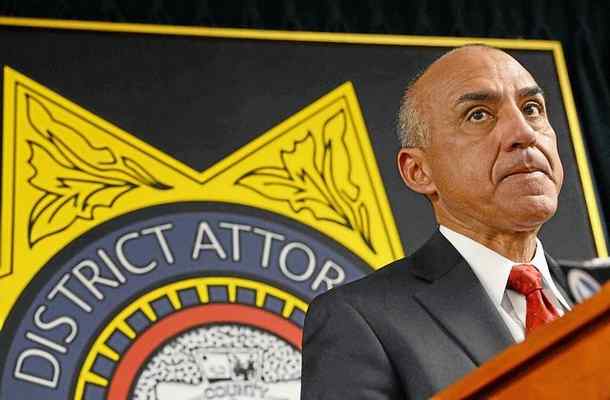 No one ever got elected District Attorney by promising to protect the public from the police. Even when the police are caught red-handed committing a crime, your local prosecutor will likely not prosecute the police for falsely arresting you, or for using force upon you.
No one ever got elected District Attorney by promising to protect the public from the police. Even when the police are caught red-handed committing a crime, your local prosecutor will likely not prosecute the police for falsely arresting you, or for using force upon you.
For example, if a police officer beats-up and innocent on video, and the officer attempts to destroy the video, the District Attorney’s Office will usually prosecute the cop for the Attempting Destruction of Evidence (a misdemeanor), but not for beating another under color of authority (a misdemeanor).
They will tell the jury at the officer’s misdemeanor trial for attempted destruction of the video of his beating an innocent, that the motive for the officer’s attempted destruction of the evidence was to hide his crimes of beating another under color of authority, and its federal analog, 18 U.S.C. § 242 (violation of federal constitutional rights under color of authority; a federal felony). However, they will not charge the cop for the beating too.
If they obtained a conviction against the cop for beating the innocent, then that issue would be “res judicata” in any subsequent civil lawsuit against the police officer by his innocent victim. The issue of whether the cops violated the federal constitutional and state law right to be free from the use of unreasonable force by a police officer, is now “a thing decided”; “res judicata” .
Accordingly, in any subsequent lawsuit by the innocent against the police and his/her employing municipal entity, the only issue that will be decided in that lawsuit is the amount of money to be awarded to the innocent victim of the police beating. The police will be “collaterally estopped” from disputing that they violated the innocent victim’s federal and state law rights to be from from excessive force.
In police caused death cases, your local prosecutor will not find fault with the officer’s conduct that caused any such death. For example, see the Orange County, California, District Attorney’s Office’s Website page on Police Related Death Reports and Videos. Every in-custody death or police killing of another is justified by the District Attorney’s Office. Every single one.
As a practical political matter, the District Attorney’s Office has to find that the cop was in the right, and the defendant was in the wrong. They have to shift the blame, from the cop who shot the man because he reached for his wallet when the cop asked for his ID, to the man for some crime that would justify the shooting.
If the DA’s Office finds that the shooting wasn’t justified, then they are going to have to explain to the public why they are not criminally prosecuting the police officer. However, they know that they cannot win criminal cases against a police officer for a duty-related action, save very few exceptional cases.
Moreover, if they convict the officer of using excessive force upon another, the injured civilian (or his surviving family if he was killed) automatically wins their lawsuit against the officer and his employing municipal entity. The issue of the wrongfulness / unlawfulness of the officer’s conduct has now already been determined against the police in by way of the criminal conviction of the officer.
Therefore, when the family of the man shot to death by the police sues the police and their employer after the officer has been criminally convicted for doing so, the police cannot re-litigate that issue in future civil cases. The unlawfulness of shooting is now “res judicata“; a “thing decided”. The only issue left for the jury to decide in a subsequent civil case is how much money is to be awarded against the police.
Moreover, Young Deputy District Attorney’s Who Have Future Political Ambitions, Within Their Agency Or Otherwise, Need The “Support” Of Local Police Agencies.
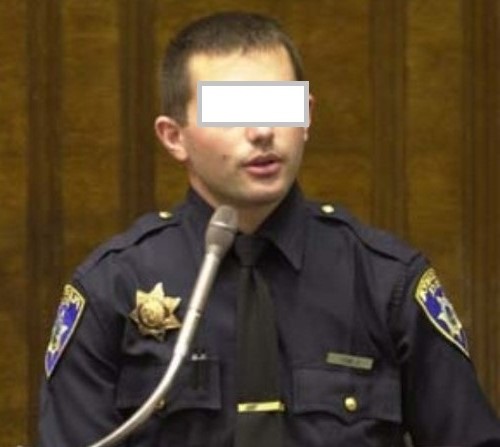 Many young Deputy District Attorneys want to curry favor with the higher-ups in the District Attorney’s Office, and you don’t , to one day get elected or appointed to higher office, like Judge. They garner this support by convicting innocents of “resistance offense” crimes one day is want to have the support of the police; support for protecting the cops for their crimes and constitutional violations against civilians. They justify their outrages in prosecuting innocent victims of police beatings and false arrests by claiming some hyper-technical reading of a resistance offenses, such as “resisting or delaying or obstructing a peace officer” (Cal. Penal Code § 148(a)(1), “The Boot of the Police State“). Those terms are so vague and ambiguous, that if those crimes didn’t involve the political machinery of the courts, those resistance offense would have struck-down as “void for vagueness” many years ago.
Many young Deputy District Attorneys want to curry favor with the higher-ups in the District Attorney’s Office, and you don’t , to one day get elected or appointed to higher office, like Judge. They garner this support by convicting innocents of “resistance offense” crimes one day is want to have the support of the police; support for protecting the cops for their crimes and constitutional violations against civilians. They justify their outrages in prosecuting innocent victims of police beatings and false arrests by claiming some hyper-technical reading of a resistance offenses, such as “resisting or delaying or obstructing a peace officer” (Cal. Penal Code § 148(a)(1), “The Boot of the Police State“). Those terms are so vague and ambiguous, that if those crimes didn’t involve the political machinery of the courts, those resistance offense would have struck-down as “void for vagueness” many years ago.
When you couple these realities with your local “authoritarian judges” (i.e. the cops can do no wrong, believing false police testimony or acting like they do, and who will not give you fair trial), there is little incentive for a police officer to be an honest one, and strong reasons not to be one.
Moreover, given the obvious consequences of ratting-out your fellow officer, we cannot expect a police officer to tell the truth. They can’t and they won’t.
There is no downside for them if they lie for a fellow officer, or for the department. Even if the police are caught telling bald-face lies under oath, there is zero chance that the officer will be prosecuted for perjury; zero. The District Attorney’s Office doesn’t prosecute police officers for perjury for lying on their behalf. They just don’t. Neither does the officer’s employing agency.
If they find out that their officer lied and wrongfully arrested, or beat or even murdered an innocent, the agency will almost never discipline the cop. If the employing police agency disciplined an officer for using excessive force against a civilian, they would be admitting civil liability against them. They don’t do that. Not these days.
If, however, they testify against their fellow officer, they need to be looking for another profession. They will be labelled a “Rat“, and will be reviled by their fellow officers, or worse.
“Rats” don’t get back-ups from fellow officers in the field when they need assistance with an arrest. Rats get bullets taken out of their AR-15 rifle clips without their knowledge.
Rats are isolated, and the Rat’s fellow officers will make bogus personnel complaints against them; orchestrated from top down. Rats then get sent for retraining, even though they may be more competent and experienced than the trainers.
Eventually, after being sent for retraining a couple of times, the Rat – Officer then gets an email from the City Manager or County Executive Officer, telling him that he/she is being fired for being a substandard officer. That is the way it works for Rats; for officers not willing to lie to frame an innocent for some fabricated crime against a police officer. This is reality (See, “If you snitch, your career is done’: Former Baltimore cop says he was harassed, labeled a ‘rat’ after attempt to root out police brutality“.)
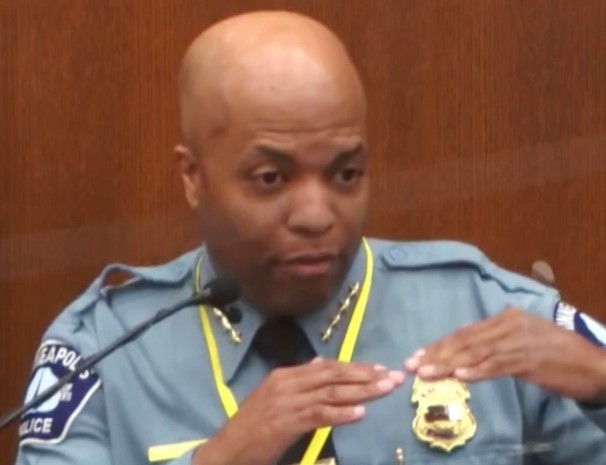 The first, and maybe the last time that you will hear the Chief of Police of a City condemn his own agency’s police officers for violence against the public, was the case of George Floyd being killed by Minneapolis PD Officer Derek Chavin in 2020.
The first, and maybe the last time that you will hear the Chief of Police of a City condemn his own agency’s police officers for violence against the public, was the case of George Floyd being killed by Minneapolis PD Officer Derek Chavin in 2020.
The video was just too good, and Chauvin’s provable behavior was so bad, that the politicians just could not defend what Derek Chauvin did to George Floyd. So, they made Derek Chauvin the political human sacrifice, and acted like the rest of Minneapolis PD are angels. It’s Time for Americans to Shed Their Blue Colored Lenses. We easily accept police excuses for beating, maiming and even killing innocents, so long the police can quote canned “officer’s safety” phrases, that are used to justify just about any sort of police outrages (i.e. the civilian took a bladed stance, or the man reached for his waistband area, the man balled-up his first or took an aggressive stance). Any cop these days can just about kill anyone who they want to, any time they so desire. This is no joke.
All that the police need to do to kill another, is to claim that he/she reached for his/her waistband area, and the officer is now officially justified in pumping you full of lead.
If the civilian victim somehow survives the shooting, he will almost assuredly be criminally prosecuted for some “resistance offense”; some crime that a conviction of, will substantially impair or preclude the shooting victim from successfully suing the police for damages, even for the most outrageous of shootings.
Just look at any local County District Attorney’s Office’s Website or Press Releases, and see how many times your local prosecutor finds fault with police officers tasing, clubbing, pepper-spraying, choking, smothering and shooting civilians. Look real hard, because you won’t find any. See, Orange County District Attorney’s Office’s Police Deaths Pages.
 Your local prosecutor knows all too well that confirmation bias for the police is so strong, that unless the police are basically hanging you upside-down and beating you like a piñata with their batons, or shooting you when you have done everything that they asked you to do, and, you have a clear video showing the same, they will not be able to get a criminal conviction against the officers. They just won’t.
Your local prosecutor knows all too well that confirmation bias for the police is so strong, that unless the police are basically hanging you upside-down and beating you like a piñata with their batons, or shooting you when you have done everything that they asked you to do, and, you have a clear video showing the same, they will not be able to get a criminal conviction against the officers. They just won’t.
American juries are too indulgent to police officers in criminal cases against the officer for a duty-related activity, to convict almost any police officer. See, Why Grand Juries Don’t Indict Police Officers?
For example, in Orange County, California, several Fullerton Police Department Police Officers were criminally prosecuted for literally beating a mentally ill, harmless and defenseless man to death. Former Orange County District Attorney Tony Rackauckas tried the case himself. He knew that the Fullerton PD Officers literally beat Kelly Thomas to death to satisfy a sick urge that those men had acquired, and that there simply was no justification for turning Kelly Thomas’ face into a pizza.
The Fullerton PD Officers put a Corporal Fullerton PD Use of Force Training Officer on the stand to testify about how Kelly Thomas was resisting the Fullerton PD Officers, so they used reasonable force to restrain him. The typically cop-loving Orange County jurors were gullible enough to believe him, and acquitted the Fullerton officers.
To make confirmation bias for the police worse than is already was, “Backing-the-Blue” is now also a form of political resistance to the “liberal media”, and to those “liberal politicians” pushing for basic police reforms.
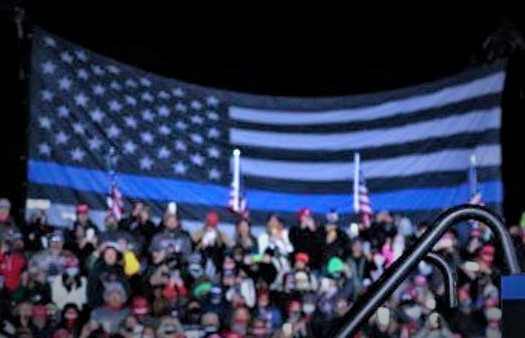 Those waiving the Back-the-Blue Flag see George Floyd as a criminal who caused the police to have to use force upon him, and they see former Minneapolis Police Officer Derek Chauvin as the victim of the “liberal media”, the “riotous mobs” (rather than protests) of the summer of 2020, and the “liberal politicians” caving into to the demands of the riotous and misguided mob.
Those waiving the Back-the-Blue Flag see George Floyd as a criminal who caused the police to have to use force upon him, and they see former Minneapolis Police Officer Derek Chauvin as the victim of the “liberal media”, the “riotous mobs” (rather than protests) of the summer of 2020, and the “liberal politicians” caving into to the demands of the riotous and misguided mob.
Because of this “Back-the-Blue” Bias, the police can get away with just about anything; that is so long as their conduct is not recorded. Otherwise, the police can simply lie through their teeth, and usually get away with it.
Some Cops Really Do Bad Things to People Who Don’t Deserve It.
Most police officers will not pick fights or provoke incidents with civilians, so they increase their arrest stats, or so they can practice their batons strikes on live bodies, or just tase or shoot them. However, none of them will “rat-out” a rogue fellow officer that does so; that is if they want to keep their jobs.
Police Officers are the best liars in the world; they’re trained professionals. They do it for a living. They don’t author police reports or testify in a way that is going to subject them or their fellow officers to internal discipline or criminal liability. If they do, their gone from the department.
Moreover, in criminal resisting arrest / battery on peace officer cases, or in civil rights lawsuits brought against police officers, none of the jurors who end-up deciding those cases have ever seen, or have been the victims of police misconduct. Any prospective jurors who have been the victims of, or have witnessed police outrages, are either routinely “excused for cause” from sitting as a juror, or excused from sitting as a juror by the lawyer for the police / government using their peremptory jury strikes.
In criminal resisting arrest / battery on peace officer cases, cases, prosecutors will do whatever they can get away with to make sure black jurors do not sit as jurors on their case. Black and brown people know all too well what it’s like for someone to treat you poorly, for no reason other than skin color.
That is not to say that black jurors will not convict a black criminal defendant. If the defendant robs a store at gunpoint, or commits some heinous crime against another, black people are not going to be anymore lenient than anyone else when sitting as jurors in non-resistance offense cases. However, black people are perceived by the lawyers as less like to believe the police “testilying” at the resistance offense defendant’s criminal trial (i.e. standard police go-to phrases, such as “the defendant took a bladed-stance”, or balled-up his fists, or cocked his arm back with a closed fist, the normal police BS lines).
In civil rights lawsuits against the police, the lawyer for the police will do the same; make sure no black jurors, or at least none who have ever seen any police outrages, sit as jurors on their case. This not from the Black Lives Matter playbook. Ask any prosecutor, criminal defense lawyer, civil rights plaintiff’s lawyer or a civil lawyer for the police. Off the record, they will all confirm this.
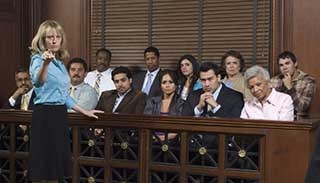 Accordingly, these jurors who decide criminal and civil police misconduct cases are persons who have no idea of the reality of police abuse of the public, and are biased in favor of the police (See, Why the Police Get Away with it; the Jury System)).
Accordingly, these jurors who decide criminal and civil police misconduct cases are persons who have no idea of the reality of police abuse of the public, and are biased in favor of the police (See, Why the Police Get Away with it; the Jury System)).
Rights only exist to the extent that they can be enforced, as a practical matter, in the real world. A right that cannot be enforced as a practical matter, is no right at all. If the victims of police outrages cannot obtain redress in court, for them, no right to be free from such outrages exist.
Unless there is free access to police files and evidence, and unless the contacts between with the police and the public are recorded, there is no practical way to show the truth, and the police are free to do with you as they please. This is reality.
This is why to this day, the largest Sheriff’s Department in the United States, the Los Angeles County Sheriff’s Department, neither audio or video record their contacts with the public . . . so there is only one side of the story; theirs. It’s not coincidental that the Los Angeles County Sheriff’s Department is riddled with their own Deputy Gangs, who routinely beat, torture, and even murder innocents; often just to join a Deputy Gang. Of course these gangster deputies have no desire to record their conduct.
Until and unless the American public excepts this reality, that many police officers really do bad things to people who don’t deserve it, nothing will change. When we finally muster the political will to curb police misconduct, we can do so. We just need to takes those Four Steps shown below to do so.
Step 1: Mandate that all police officers wear Body Worn Cameras that they cannot turn-off, and that automatically send video recordings to a cloud, so that the police cannot conceal, alter or destroy their recordings.
Police officers behave better when they know that they are actually being recorded, and when they know that they cannot alter or delete their recordings, or claim that they didn’t make one. Even with many police agencies now requiring their Deputies / Officers to wear Body Worn Cameras (BWC), often the police claim that they forgot to activate their BWC, or somehow their agency lost the videos.
Many police agencies still do not record their contacts with the public, nor is there any constitutional requirement to do so. The Los Angeles County Sheriff’s Department, the largest Sheriff’s Department in the United States, to this day does not have either audio or video recording devices issued to its deputies. See, Why the Police Don’t Want Their Conduct Recorded.
Sending live non-stop video recordings to a cloud will reduce much of this lying and cheating by police agencies, and will help bring the truth to light. Otherwise, we are relegated to a swearing contest between the civilian and the officer; a contest that officers usually win; again, due to confirmation bias.
Most police Body Worn Camera videos are .mp4 files, that anyone with a computer can alter. It’s really easy to do. Don’t think for a minute that the police will not alter a Body Worn Camera Recording if it shows them committing some outrage.
If there had not been a video recording of Minneapolis Police Officer Derek Chauvin killing George Floyd, the police story would have been that Mr. Floyd kept lunging at the police, and punching and kicking them, and reaching for his waistband, and grabbing for Derek Chauvin’s gun, and exhibiting super-human strength, and made the officers fear for their lives, so they had to restrain him, because they wanted to go home at the end of their shift, and not get killed. This is what police agencies do.
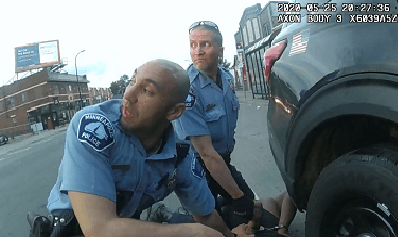 Moreover, if there had not been a video recording of Derek Chauvin killing George Floyd, instead of the Minneapolis Chief of Police testifying that Officer Chauvin’s use of force upon George Floyd was excessive, some MPD Use of Force Training Officer would have been testifying as to how proper and reasonable Derek Chauvin’s Use of Force upon George Floyd was. He would have been criminally prosecuted for assaulting Derek Chauvin, and he would have been convicted; precluding him from suing for the excessive force used upon him. That is reality. That is the way things work.
Moreover, if there had not been a video recording of Derek Chauvin killing George Floyd, instead of the Minneapolis Chief of Police testifying that Officer Chauvin’s use of force upon George Floyd was excessive, some MPD Use of Force Training Officer would have been testifying as to how proper and reasonable Derek Chauvin’s Use of Force upon George Floyd was. He would have been criminally prosecuted for assaulting Derek Chauvin, and he would have been convicted; precluding him from suing for the excessive force used upon him. That is reality. That is the way things work.
The government would have also put their Forensic Pathologist on the stand to testify that Mr. Floyd died from a pseudo-condition known as “exited delirium”; a condition that doesn’t really exist, but is used by the police as the excuse for detainees suddenly suffering a cardiac arrest when struggling with police officers. See, Why ‘excited delirium’ came up at Chauvin trial?
The judges and the prosecutors go along with this game of prosecuting the victims of police outrages, as they either are “true believer” judges and DAs who really do not see evil in anything that the police do, or who are simply people who value their jobs more than vindicating the innocent.
The police are professionals at story spinning and actual fabrication or concealment of evidence, and they have protocols for handling the witnesses and evidence for any police shooting, or other situation that may result in civil liability.
They whisk the officers involved in the shooting / events, away to the police station for a “Public Safety” Interview. This creates the initial rough framework for the police to tart lying to the public (the first version of the events), and to weave a narrative about what necessitated the shooting.
They routinely unlawfully detain and transport witnesses to the police station (that’s actually an arrest), and coercively interview them to produce “recollections” most favorable to the police. Didn’t your see the man lunge at the officer? Didn’t it look like he was going for a gun? Didn’t he seem intoxicated, or dangerous? Didn’t you think that the officer was in danger?
When they find out what recordings are out their, and what the witnesses say, the police then shape the testimony of the shooting / injuring officer, who is interviewed much later, often weeks, to create a false narrative that is not disproven by witnesses and recordings. They create a narrative concluding that the “criminal actions” of the victim of the police shooting / beating, caused the officer to have to shoot or beat him/her. This is simple blame-shifting; “You made me shoot you, or beat you, or tase you, etc.”
Civilian cell phone video recordings are often very helpful in showing at least part of an incident. However, no one usually starts video recording until there is something to record, and by the time that happens, the beginning of the altercation has already occurred, and the video will usually not show how the altercation began; something that usually defines who is in the right, and who is in the wrong.
Moreover, we know that the truth will never see the light of day if society relies on the testimony of the police to show the same.
Having BWC evidence of what actually happened is the only way to curb police outrages; the only way.
The politicians in many cities and counties have outfitted their police officers with patrol video recording systems and Body Worn Cameras. However, the police and their employing agencies have been busy deleting, altering and concealing those recordings. We cannot trust the police to preserve and produce their recordings. They won’t do so. They won’t be honest without a fight. They know that even if they get caught altering or concealing or destroying their recordings, that rather than discipline the officer, the officer’s employing agency will now conceal the officer’s concealment.
Having the video recording instantly sent to a cloud will reduce this sort of monkey business. The truth about what happened between the civilian and the police. There is no other way.
Step 2: Create an Independent Prosecutorial Agency, whose only function is to criminally prosecute police officers for on-duty related actions.
State and local prosecutors prosecute the victims of police beatings and false arrests; not the violating police officers. See, Why Grand Juries Don’t Indict Police Officers.
County District Attorneys and their Deputy District Attorney’s want to curry favor with the police; often for political support or for anticipated career advancement; both within and without (i.e. judge) the District Attorney’s Office. No one ever got elected to Executive Office in this country by promising to protect the public from the police.
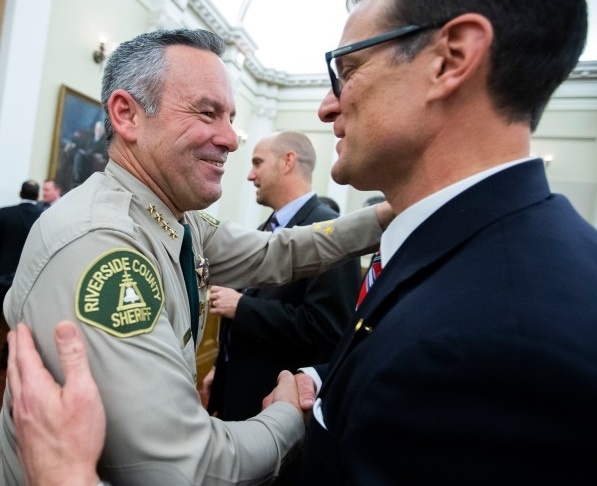 Moreover, in the real world, when the police use unreasonable force upon a civilian and arrest them for some “resistance offense“, your local County Deputy District Attorneys will gladly take it upon themselves to preclude you, the victim of the police beating and the false arrest, and now victim of a bogus and malicious criminal prosecution, from being able to sue the very person who committed the constitutional violations and outrages against you; the accusing police officer.
Moreover, in the real world, when the police use unreasonable force upon a civilian and arrest them for some “resistance offense“, your local County Deputy District Attorneys will gladly take it upon themselves to preclude you, the victim of the police beating and the false arrest, and now victim of a bogus and malicious criminal prosecution, from being able to sue the very person who committed the constitutional violations and outrages against you; the accusing police officer.
This is blame-shifting; alleging that an accused’s own criminal conduct necessitated the officer in shooting or otherwise injuring him. Moreover, it’s gamesmanship; deliberately convicting the innocent, to protect the officer and his/her agency from civil liability.
Most modern District Attorney’s Office’s have some sort of “CAPO” (Crimes Against Peace Officers Unit) to carry-out convicting the innocent victim of police outrages, to protect the police from their victims. If the victim of a police beating is convicted of some resistance offense, he/she will likely be “collaterally estopped” (prevented via prior adjudication against you on issue), or otherwise barred via Heck v. Humphrey, 512 U.S. 477 (1994). This is normal. This is reality. This is how things work in the real world. See, San Bernardino County DA Launches New Unit For Crimes Against Police Officers, May 13, 2015.
However, when a good quality video recording surfaces that shows totally indefensible Police Misconduct against an innocent, the Media, the politicians and the public expect the officer’s head to roll for their outrages.
When an agency’s sole function to to prosecute the police, things will change. They will disbelieve the almost always contrived police version of events, and will look for police officers to prosecute; knowing that only the most egregious duty-related police outrages have any chance of a criminal conviction of a police officer for such conduct.
Step 3: Amend our Federal Civil Rights statute, 42 U.S.C. § 1983 to now include “Respondeat Superior” liability (and have the states enact their own constitutional torts statutes).
Qualified Immunity Has Gutted American’s Redress for Constitutional Violations Perpetrated Against Them by the Police.
Qualified immunity is a doctrine created by the U.S. Supreme Court in Harlow v. Fitzgerald, 457 U.S. 800 (1982) that gives police officers and other public officials immunity from lawsuits for violating the constitutional rights of another, so long as a reasonably competent police officer could have believed that their actions were lawful.
That doctrine has resulted in a very large percentage of civil rights plaintiffs being told by the courts that although their constitutional rights were clearly violated, that since the law on that issue was not so clear as to be “beyond dispute”, the police officer is immune from suit. In the law, there is almost nothing that is “beyond dispute”.
This misguided Doctrine of Qualified Immunity has resulted in plain crazy Appellate Court decisions; so crazy and so oppressive that one might wonder which one of our Constitutional Rights are really left.
So, for example, in Jessop v. City of Fresno, No. 17-16756 (9th Cir. 9/4/19), Fresno, California, Police Department officers executed a search warrant for Mr. Jessop’s home. During the search the police found and seized $275,000.00 in cash and coins. However, the officers only turned-in $50,000.00; putting over $225,000.00 in their pockets.
In holding in favor of the police who stole Mr. Jessop’s money, the Ninth Circuit Court of Appeals held that no Supreme Court or Ninth Circuit decision had held that the stealing of money by the police during a search warrant execution was an “unreasonable seizure” of property under the Fourth Amendment to the United States Constitution, so the officers walk free:
“Nor is this “one of those rare cases in which the constitutional right at issue is defined by a standard that is so ‘obvious’ that we must conclude . . . that qualified immunity is inapplicable, even without a case directly on point.” . . . We recognize that the allegation of any theft by police officers—most certainly the theft of over $225,000—is deeply disturbing. Whether that conduct violates the Fourth Amendment’s prohibition on unreasonable searches and seizures, however, would not “be ‘clear to a reasonable officer.’” . . . Appellants have failed to show that it was clearly established that the City Officers’ alleged conduct violated the Fourth Amendment. Accordingly, we hold that the City Officers are protected by qualified immunity against Appellants’ Fourth Amendment claim.“ Jessop v. City of Fresno, No. 17-16756 (9th Cir. 9/4/19)
How could this case not be “one of those rare cases in which the constitutional right at issue is defined by a standard that is so ‘obvious’ that we must conclude . . . that qualified immunity is inapplicable, even without a case directly on point”?
The Fourth Amendment protects against “unreasonable searches and seizures of persons, places and things; property“. If police officers stealing money from the target of a search warrant during a search warrant execution, is not “one of those rare cases in which the constitutional right at issue is so obvious that . . . qualified immunity is inapplicable”, then no case is.
The Jessop decision is simply crazy and creepie. The Fourth Amendment provides:
“The right of the people to be secure in their persons, houses, papers, and effects, against unreasonable searches and seizures, shall not be violated, and no warrants shall issue, but upon probable cause, supported by oath or affirmation, and particularly describing the place to be searched, and the persons or things to be seized.”
What police officer could possibly believe that stealing $225,000.00 during a search warrant execution is not an “unreasonable seizure” of property? None. We all know this. Why then should Mr. Jessop lose his case? To make things even worse, in the Jessop Opinion by the Ninth Circuit, the Court didn’t even say that the police stealing money from another is a Fourth Amendment violation.
Unless there is a United States Supreme Court case after Jessop that states the obvious, that such conduct is a Fourth Amendment violation, any future stealing of money during search warrant executions will still end-up with the officers not being liable to their theft victim.
After all, even after the Jessop decision, the issue still is not resolved. This is insane, and this type of thinking will lead to the destruction of the American judicial system.
The U.S. Supreme Court has shown that it is not willing to abandon Qualified Immunity for the police. If we want to have Constitutional rights, they must be rights that can be enforced. With the ugly head of Qualified Immunity looming over us, as a practical matter, we have very few rights left.
Although the U.S. Supreme is Not Willing to Abandon Qualified Immunity for the Police, Congress Has the Power to Cure the Problem Created By It.
In most lawsuits in the English speaking world, an employer is usually liable to a third party for torts (civil wrongs) committed by their employees, so long as the employee was acting in the course of and within the scope of their employment. So, if a truck driver employed by Pepsi is delivering Pepsi to stores and he accidentally runs a light and causes a traffic collision, Pepsi is liable to the other driver. This is known as respondeat superior liability.
Although federal civil rights lawsuits are supposed to be based on general tort law principle, the Supreme Court has held that respondeat superior liability does not lie in such cases.
In Monell v. Dept. of Social Services, 436 U.S. 658 (1978), the U.S. Supreme Court held that Congress did not intend for public entities (i.e. cities and counties) to be liable for the actions of its police officers via respondeat superior liability. The Supreme Court held that Congress could not have intended that the municipal employers of police officers be liable to the injured party via respondeat superior liability.
They also held that public entities are only liable for the constitutional violations of its police officers (under 42 U.S.C. § 1983) if a policy or custom or practice of the police agency is a proximate cause of the constitutional violation (i.e. agency uses illegal chokeholds, or has an unconstitutional tasing or shooting policy, or the police agency failed to properly train its officers on a particular area of law).
However, all that Congress needs to do is to enact a federal statute stating that municipal employers of police officer are liable to the injured party via respondeat superior liability, and the problem is solved.
Because qualified immunity from suit does not apply to public entities (i.e. a City or County), if respondeat superior liability to federal civil rights cases (42 U.S.C. § 1983), if the court finds that there is a constitutional violation, the person whose constitutional rights were violated by the police will be able to obtain compensation for those constitutional violations perpetrated against from the employing municipal entity. This is the solution, as the Supreme Court does not seem disposed to getting rid of qualified immunity.
Step 4: Amend Resistance Offense Statutes, such as resisting / obstructing / delaying peace officer, Cal. Penal Code § 148(a)(1), and doing so with force or violence. Cal. Penal Code § 69.
“To satisfy due process, a penal statute [must] define the criminal offense [1] with sufficient definiteness that ordinary people can understand what conduct is prohibited and [2] in a manner that does not encourage arbitrary and discriminatory enforcement”. See, United States v. Skiling, 561 U.S. 358 (2010).
California Penal Code §§ 148(a)(1) and 69 are the quintessential “void for vagueness.” statutes.
Section 148(a)(1) used to be the statute of choice by police officers to arrest a civilian for “failing the attitude test”. See, Contempt of Cop / Resisting Arrest Cases. After all, what exactly is “resisting” or “obstructing” or “delay” a peace officer in the lawful performance of their duties?
If you are walking down the street and see a police officer handcuffing a civilian, and placing them into their patrol car, and then searching the car, they seem to be lawfully performing their duties. Most of us would indulge the police with that presumption that they are probably acting lawfully.
However, if you are walking down the street and see a police officer repeatedly kicking a handcuffed man in his head, who is lying helplessly on the sidewalk and bleeding badly, the “reasonable person in the abstract” would not believe that the police officer was acting in the lawful performance of his/her duties.
In the former example, officer placing handcuffed civilian arrestee in patrol car, notwithstanding the lawfulness of the police conduct, a civilian nonetheless may verbally challenge, protest and even delay the officer in some manner. Verbal protest of and challenge to police action is protected speech under the 1st Amendment to the United States Constitution:
“The freedom of individuals verbally to oppose or challenge police action without thereby risking arrest is one of the principal characteristics by which we distinguish a free nation from a police state”. Houston v. Hill, , 482 U.S. 451 (1987) (striking down a Houston City Ordinance that made is a misdemeanor “to assault, strike or in any manner oppose, molest, abuse or interrupt any policeman in the execution of his duty.”)
Nonetheless, in the real world, taking the same actions towards a real police officer as Mr. Hill was prosecuted for, will definitely get you at least arrested, and possibly beaten too (shouting at police in an attempt to divert their attention from his friend during a confrontation; challenging officer’s right to arrest and search).
In the later example (police officer repeatedly kicking a handcuffed man in his head, who is lying helplessly on the sidewalk and bleeding badly), no doubt that a civilian can even physically intervene and stop the officer from beating his arrestee. However, again, in the real world, doing so will get you at least arrested, beaten and very possibly shot too.
These are two extreme examples of the inherent ambiguity of California Penal Code §§ 148(a)(1) and 69. Other situations may not be so clear.
How about a situation where you are sitting in your car in a park and an officer walks up to you and demands identification. Is it a crime to fail to do so?
How about a situation where you are walking down the street and an officer tells you to prone yourself down onto the sidewalk in the rain. Is is a crime to fail to do so?
How do you know if you’re being detained, or lawfully detained?
When can the police detain someone? When can the police search or pat-down another? When can the police point a gun at another? When can the police make a warrantless entry into a private residence? When can the police perform a protective sweep of a residence? When can the police use different levels of force, and what are they? When can a police officer order someone to exit their cars or homes? When do peaceful verbal protests of an officer’s conduct cross the line and turn into criminal resistance / obstructing / delay of a police officer? These are not easily answered questions, the answers to which require advanced legal training; well beyond the training of most police officers, and certainly beyond the knowledge of the general public; something that is necessary for a criminal statute to not be void for vagueness.
Cal. Penal Code § 69 (threatening or using force of violence to deter or resist officer) Cal. Penal Code § 148(a)(1) creates an opportunity to arrest innocents for “imaginary”(contrived) conduct, that is really no crime at all.
Section 148(a)(1) is the prosecutions / government’s vehicle to beat-down the victims of the police abuse (i.e. false arrests, excessive force); to use a criminal case to preclude or impair civil redress to those police abuse victims. See, Heck v. Humphrey, 512 U.S. 477(1994) (can’t sue for false arrest if convicted of crime, even if government didn’t have warrant or probable cause to arrest when arrest was made); See also, Susag v. City of Lake Forest, 94 Cal.App.4th 1401 (2002) (can’t sue cops for excessive force if convicted of resisting arrest.)
There are some exceptions to being totally precluded from suing the police by way of conviction, but they are few and far between in the real world.
There are a variety of Appellate Court cases that provide guidance on what exactly, Section 148(a)(1) prohibits, and what type of conduct is, or is not, proscribed by that statute. So, for example, Appellate cases regarding Section 148(a)(1) show guiding lights as to what that statute means, such as: 1) a person need not quickly respond to even lawful police commands, and has a Constitutional right to verbally challenge, dispute or protest police actions (See, People v. Quiroga, 16 Cal.App.4th 961, 966 (1993).) That’s really not what the problem is.
The problem is, that in a real criminal trial, in a real California Superior Court, with a real California Superior Court Judge, it is unlikely that when the jury is instructed by the Court on what conduct Section 148(a)(1) prohibits, the Standard California Judicial Council Jury Instructions for violation of Section 148(a)(1) will be given, and not those other Appellate Court cases that provide enough guidance for a jury to know what Section 148(a)(1) actually proscribes.
In a Section 148(a)(1) or Section 69 prosecution, the jury is not only the judge of the facts, that are the judge of the law, as the law is so vague that they can just about convict anyone for any contact with the police. In the English common law and American systems of justice, the jury is the trier of fact (the one that decides what is true or not), and the court is supposed to be the judge of the law. This breaks-down in Resistance Offense cases.
We need to enact very specific “resistance offenses” so that the general public would be on alert that they are breaking the law by engaging in certain prohibited conduct. Otherwise, we are all subject to arrest for conduct that is legal, or conduct that isn’t but not understandably criminal.
SUMMARY:
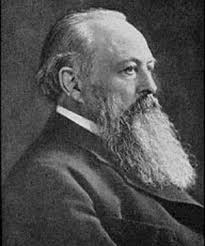 As shown above, Police Misconduct in America is real and growing. We are not going to reduce police misconduct by defunding the police. Rather, we have to accept the fact that these days the police have too much power.
As shown above, Police Misconduct in America is real and growing. We are not going to reduce police misconduct by defunding the police. Rather, we have to accept the fact that these days the police have too much power.
As Lord Acton stated a long time ago, “Power tends to corrupt, and absolute power corrupts absolutely”.
By deferring to police accounts of altercations with the public, and by excusing police adherence to constitutional constraints on their conduct in the name of “Officer’s Safety”, we have simply given the police too much power. See, The Modern Police State: “Officer’s Safety” Replaces “Probable Cause”.
If we have the political will do so, we need to take Four Basic Steps to curb Police Misconduct:
- Step 1: Mandate that all police officers wear Body Worn Cameras that they cannot turn-off, and that automatically send video recordings to a cloud, so that the police cannot conceal, alter or destroy their recordings.
- Step 2: Create an Independent Prosecutorial Agency, whose only function is to criminally prosecute police officers for on-duty related actions.
- Step 3: Amend our Federal Civil Rights statute, 42 U.S.C. § 1983 to now include “Respondeat Superior” liability
- Step 4: Amend Resistance Offense Statutes, such as resisting / obstructing / delaying peace officer, Cal. Penal Code § 148(a)(1), and doing so with force or violence. Cal. Penal Code § 69.
Jerry L. Steering, Esq.
